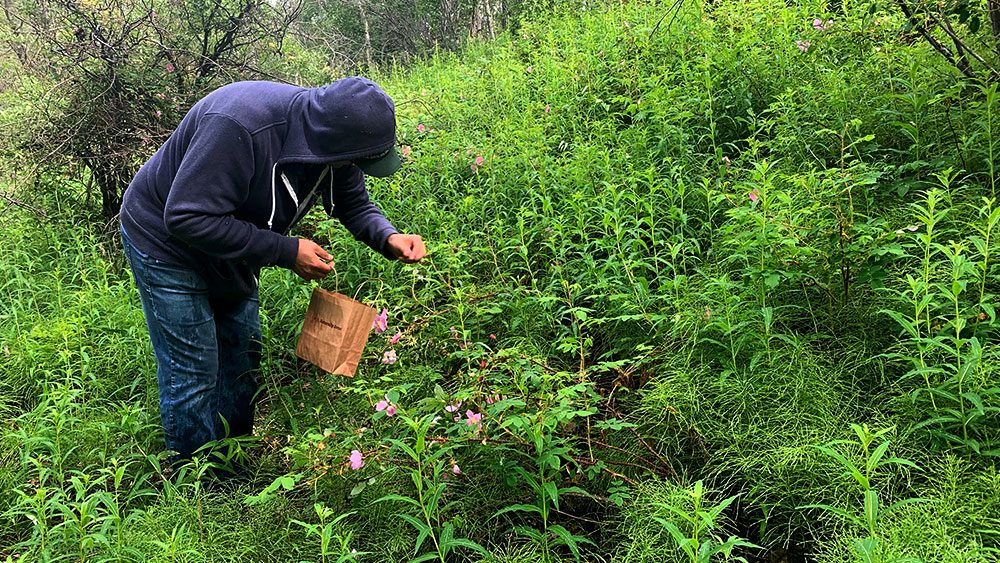Lila Fraser Erasmus squats down and carefully plucks three petals off a wild rose flower.
She explains that by leaving two of the five petals she can harvest what she needs and bees can pollinate.
Fraser Erasmus is of the Northern Tutchone people and originally is from Mayo, Yukon, but now resides in Denendeh.
She’s the owner of Naturally Dene and a firm believer that her land-based knowledge is useless unless shared with others.
Naturally Dene is a business run by Fraser Erasmus and offers cultural teachings, medicine walks and workshops along with all-natural products from the north.
On this day she is joined by half a dozen curious participants in a medicine walk around the Yellowknife River.
“The Dene have done it for centuries, and we continue to do it today. That’s something important for people to understand. To know that this is still very much a way of life for us,” Fraser Erasmus says.
(“Today we have medicines that will only heal us temporarily,” says Lila Fraser Erasmus. Photo: Charlotte Morritt-Jacobs/APTN)
Drawing on knowledge she acquired as a young girl along the Mackenzie River and teachings she’s picked up from reading, she began making her own creams and locations completely chemical free.
“One of my elders talks about when you put the goose grease on your skin that it will help any skin ailment and it will never come back. Today we have medicines that will only heal us temporarily. We have pharmacies that survive on the fact that they won’t heal us,” she says.
Naturally Dene stresses the importance of sharing more than just the medicinal and nutritional properties.
Fraser Erasmus says the most exciting part of the walk is the cultural exchange between participants.
Lucero Hernedez is originally from Mexico but has been living in Yellowknife for the past year.
“There is a lot of things in common for medicine. From the origin of the words, and what plants we use like roses,” Hernedez says.
This is her first time picking medicine and she is learning a lot.
“For me the Labrador Tea because normally I was thinking we can use only the leaves for a tea but you can use the flower for a mask or for the skin. We can use all the plant,” she says.
Fraser Erasmus there are traditional language ties between the Dene of Denendeh and Indigenous peoples from Mexico.
Even as they trek through the bush squatting mosquitoes, participants are surrounded by plants which provide a natural bug repellent.
“When we come out and do the workshops I make sure we have the tobacco and smudge. I really want people to experience that and have that information,” Fraser Erasmus says.
(“Mother earth needs us, she needs us to understand her,” says Fraser Erasmus. Photo: Charlotte Morritt-Jacobs/APTN)
Josée Clermont, who works at the Collège Nordique Francophone says she is taking the course as a commitment to reconciliation.
“What I like about the Dene culture is being so grateful with the prayers at the beginning and at the end. It’s a reminder that there is something bigger than us out there and we are lucky to live in a place like this with so much to offer,” she says.
Each participant is going home armed with a bag full of medicine and teachings to share with others.
“A lot of the plants that we talked about we see all the time but I had no idea they were edible,” Clermont says.
Fraser Erasmus ends the medicine walk with a closing prayer that each participant goes out and respects and thanks the land for providing everything they need.
“Mother earth needs us, she needs us to understand her. If we don’t then we will continue to be disruptive. They say we are killing mother earth but she will survive after we are gone. We are killing ourselves,” she says.












